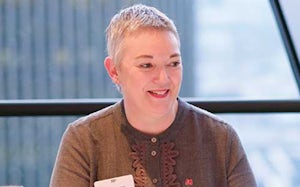 How can GCs attract the appropriate talent and keep the lawyers in their teams motivated? Panellists at the GC2B roundtable provide insight as well as practical ideas on managing teams in-house.
How can GCs attract the appropriate talent and keep the lawyers in their teams motivated? Panellists at the GC2B roundtable provide insight as well as practical ideas on managing teams in-house.
John Lucy, BLP: What are the challenges of recruiting and attracting talent? What do you do when people have peaked and no longer have a role in the organisation?
Sally-Ann James, Metro Bank: I joined Metro Bank in 2012 and my title was sole counsel, which made me really self-aware. To put it into context, when I joined the organisation there were 400 employees and now there are 3,500. The organisation has grown more quickly than I’ve been able to grow the legal team.
My experience is that people are actually very keen to come and work for us. So far I’ve managed to recruit people without having to use recruitment agents; they’ve come through LinkedIn and recommendations.
Peter Dickinson, Mitie: It’s interesting to ask if legal is prioritised in organisations. We have 53,000 employees. We have 800 in finance, and there are 18 lawyers including co-sec functionality in our business. We are a contracting business and we turn over £2.5bn a year, we almost only do business on customer’s paper and yet we only have that number of lawyers.
From a risk management perspective at the moment I’d say the focus has been lacking in application in terms of legal contracting risk. We don’t have difficulty recruiting people in the sense that there are a lot of disillusioned people in private practice and what it does not offer is obvious career progression.
Participants
Alex Williamson, head of FRM legal, Man Group
Sally-Ann James, general counsel, Metro Bank
Ian Jameson, managing director and general counsel EMEA, Sumitomo Mitsui Banking Corporation Europe
Jason Elphick, general counsel and company secretary, OneSavings Bank
Lisa Maxwell, senior legal counsel, Informa
Marie-Anne Birken, general counsel, European Bank for Reconstruction and Development (EBRD)
Nick Hartigan, head of legal, Kier Group
Peter Dickinson, general counsel and company
secretary, Mitie
Moderators
Catrin Griffiths, editor, The Lawyer
John Lucy, HR director, Berwin Leighton Paisner
Catrin Griffiths, The Lawyer: Doesn’t it depend what organisation you’re joining as well? With private practice you can guess the culture but if your business going through various convulsions it’s going to be a completely an unknown career path.
Marie-Anne Birken, EBRD: We have a large legal function – in total we have 173, of whom 95 are lawyers. Recruitment is actually easy for us; we have had an incredible pool of lawyers coming from the large firms, magic circle firms and US firms who are overworked and complain of having no life. They join us for two-thirds of the salary they enjoyed in private practice.
What is an issue is career progression. A lot of the lawyers in the team are very senior and joined 15 or 20 years ago, and the problem is that there are few opportunities for them to grow.
Our team is mature which means it is expensive. They become rather frustrated because they don’t progress.
Catrin Griffiths, The Lawyer: Anyone else have a mature team, or a green team?
Ian Jameson, Sumitomo Mitsui: A fairly mature team. I’m responsible for legal which is a team of about 20 with quite a mix of expertise. I’m also responsible for company secretarial and compliance.
When I was at Lehman Brothers there were eight flavours of lawyer and one head of compliance. Now, sitting round the table, I might have five or six lawyers from compliance and one head of legal.
I spend a huge amount of time on compliance matters, dealing with regulators, ensuring that essentially we have good credit with the regulators at all times.
Recruiting for us is not a problem. There are plenty of good lawyers in the market. But getting the right skills in compliance is difficult whereas in legal it’s not a problem because you have a fantastic training environment in the City of London and City law firms.
Jason Elphick, OneSavings Bank: I’ve got two trainees and I have a team of about six lawyers. My focus on the team has been to develop people in the team and the culture of development. I encourage people to be honest about their aspirations.
Catrin Griffiths, The Lawyer: And have you sketched out a trajectory for them?
Jason Elphick, OneSavings Bank: I’m not their line manager, but you’ve got their business goals. Then we have their personal goals and for most of the people in the team we have a pretty clear idea about what their three and five-year aspirations are.

Marie-Anne Birken, EBRD: For a lot of lawyers – maybe because we are public sector – there’s an expectation that there is a career path. There seems to be a sense of entitlement – some think you’re responsible for their development and career.
Peter Dickinson, Mitie: When you’re managing people you have to be honest.
I think a mature business, say in private practice, you should be able to say to people ‘you aren’t going to make partner’ and to say it early so they can look for opportunities and place them with potential clients. I think with the in-house role it is the same; you should be able to have a dialogue with somebody and ask them what their aspirations are and what they’d like to do.
Sally-Ann James, Metro Bank: What can sometimes happen is that you create all these fantastic people with all these skills that are able to go elsewhere, and when you do need a successor they’ve gone. That balance is difficult: to give people the impetus to want to stay. One of the ways you can get around that is to second people into
different areas of the business, give them some more commercial experience.
Catrin Griffiths, The Lawyer: As close observers of in-house teams and private practice, we all know the difference between, say, Slaughters and Mishcon. You just know it. It’s very different when it comes to in-house, so how you differentiate the culture to create a sense of innovation?
Marie-Anne Birken, EBRD: I came in from the outside to this position not because there were people inside who couldn’t do the job, but there was a need to get a fresh perspective. People inside had been in the bank for a long time and were therefore institutional, and there was the perception that there would not be innovation unless you brought in someone from the outside.
Sally-Ann James, Metro Bank: The responsibility is on them as well. With such a large pool of people I’d expect some of them would have put themselves forward and engage with people in the business at a senior level to get their faces known.
Marie-Anne Birken, EBRD: People have to want that though. There are opportunities for secondments and training, but people have to want to do different things and sometimes people like what they are doing and just want to be promoted.
Lisa Maxwell, Informa: This is often a question of culture and creating a culture of high performance and integrity. If you create that culture you don’t have to persuade people to stay.
Marie-Anne Birken, EBRD: Yes, but then people still have to decide if they want to leave. If you’re senior, well-liked and you like your role, where are you going to go?

Ian Jameson, Sumitomo Mitsui: This comes back to the psychology point. It’s surprising how often people fail to see themselves as others see them so you often find lawyers deep in the detail of deals but legal is a cost centre, and it isn’t the be-all and end-all of a corporate’s being – it is if you are a good lawyer in a law firm. Understanding the role and how you make yourself useful and visible is key, and surprisingly people have difficulty with this.
John Lucy, BLP: Does anyone around the room use psychometrics or any other analytical tools?
Marie-Anne Birken, EBRD: We have a management training programme and you apply for a position at the bank so there’s a certain amount of testing.

Sally-Ann James, Metro Bank: If you join us you have to do the conga. We have something called Visions which is the first two days you join and on the first day you have to join the group and make up a song and do the conga in the office wearing feathers. If you’re not able to do that – and not everyone can – you would not fit in to our culture.
Some lawyers said they wouldn’t do it. We are expected as lawyers to not stand apart from the rest of the organisation. We have to embrace it.
Alex Williamson, Man Group: So do you think people come and work for you because of the culture you stand for?
Sally-Ann James, Metro Bank: It’s something people are attracted to and something you can give them. We want to give them something other than just being a lawyer every day.
Marie-Anne Birken, EBRD: We have a lot of lawyers coming from the countries where we operate, for example Ukraine or Kazakhstan. They had the opportunity to move and want to give back to their country. That is quite defining but it wears off. It’s something that makes people want to come but you have to give them other reasons too.
John Lucy, BLP: Do those you are interviewing ask you about career progression?
Lisa Maxwell, Informa: There’s a line manager who talks about the things that are important to you and how you’re meant to meet targets and bonuses. But we have catch-ups with who you are managing.
Obviously, you discuss career progression during the year.
John Lucy, BLP: Are those who have been in private practice and then move in-house naive?

Lisa Maxwell, Informa: I’m not sure it’s naivety but it is about lifestyle. People think that if they move in-house they’ll be working 9 to 5 and that is not the case – especially if you’re leading M&A transactions it’s not possible.
Then there’s the pressures of response too – you’re in a management meeting and your client is right there whereas in private practice you’re always a phone call away. You don’t have the luxury of time.
Catrin Griffiths, The Lawyer: Do you feel there is something you want more from your career in terms of the skills or experience, or management experience? What’s your feeling about where you want to see yourself in the next five years?
Lisa Maxwell, Informa: I’d like more experience in managing a business and people. Those are the two critical things an in-house lawyer needs to be able to do.
Alex Williamson, Man Group: To speak personally, the variety is great but the intensity of the decision-making is why people should go in-house. The legal team used to be twice the size it is and in the old days people felt more special when they were head of a big legal team. Now, it’s less about managing the team, it’s managing externally; managing projects. It’s about doing more with less.

Continue the journey
GC2B run regular roundtable events discussing the current issues affecting in-house lawyers. To join the debate, attend an event or for more information, contact: delegates@thelawyer.com for more information
GC2B is an initiative from The Lawyer and Berwin Leighton Paisner
































